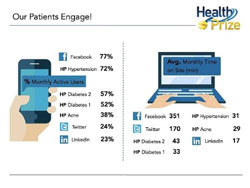 |
| Katrina Firlik |
Earning points for filling a prescription and winning prizes for sticking with meds might sound like a patient's dream come true. For pharma, the idea could be an adherence game-changer. According to new study results from HealthPrize Technologies, more than half of patients who participated in the company's gamification efforts continued to fill their prescriptions and stayed with the programs over time.
HealthPrize surveyed patients of different ages with conditions such as acne, hypertension, diabetes and asthma/COPD, and found that individuals kept logging onto the company's mobile and online platforms each week. Patients with asthma/COPD logged into the program an average of 7.7 times a week, while individuals with acne engaged with the program about 2.7 times a week. In particular, HealthPrize's system decreased the average amount of time between prescription refills for patients with diabetes by 39%.
The difference in patient login times across conditions could be attributed to age, Katrina Firlik, HealthPrize's Chief Medical Officer, told FiercePharmaMarketing. Most patients in the acne study were in their early 20s and may interact more with mobile platforms, while individuals in the hypertension study were older and perhaps spend less time with digital media.
But the amount of points a patient wins in each program could also affect outcomes, Firlik said. HealthPrize customizes its gamification platforms for different companies or medications, so in one game, some patients might not get points for completing surveys about a drug or condition, while in another program, they do. A lack of points may have caused some patients to fall off the adherence bandwagon--which, in a sort of reverse logic, also proves the idea that game-playing can keep people on their meds.
 |
| HealthPrize's gamification platforms showed promising performance when compared to popular social media sites.--Courtesy of HealthPrize Technologies |
HealthPrize is also touting impressive numbers for its gamification platform compared to popular social media sites. Seventy-two percent of patients enrolled in the company's hypertension study engaged with the gamification program on a monthly basis; Facebook members went onto that site at least once a month. The average LinkedIn user spends about 17 minutes on the site per month, while HealthPrize's diabetes study group spent about 43 minutes per month on the company's website or playing games on their mobile devices. Across all HealthPrize's programs, the average user spent almost 37 minutes playing and learning each month.
Next up, HealthPrize plans to expand its gaming platform to include more health conditions and to amp up social interactions among points-earning patients. Possibilities? Patients might be able to create personal profiles so they can track their progress against other users and learn more about individuals with similar conditions. Or HealthPrize might add content-sharing features that allow individuals to share news with family and friends.
"Patient engagement is really the Holy Grail in personal health, and we're making headway in making the patient experience more enjoyable. This is key in getting patients involved in an online and mobile program," Firlik told FiercePharmaMarketing.
- read the release
Special Report: Top 10 pharma companies in social media